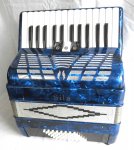I suppose its easier to think about it in terms of what makes economic sense, and why. Of course China could make a great accordion - as could Saudi Arabia etc., but that doesnt mean it would make any sense to do it. It seems to me though that the made-in-China business model is to serve the buyer who wants above all to get the lowest possible price. That accounts for almost everyone, and the few who will pay significantly more for a new accordion are easily served by whats left of 1st world production. Chinas intrinsic advantages - low standard of living, compliant workforce - are dwindling anyway, and what keeps them in business is the established industrial infrastructure that has moved there from the 1st world. To the extent thats relevant to accordion manufacture, they could capture a larger segment of the market than would make sense strictly from a labor cost perspective - but Im guessing it isnt really relevant, that accordion manufacture remains pretty low tech. Do the higher end makes still use Italian reeds, even when not made in Italy? I think so.

